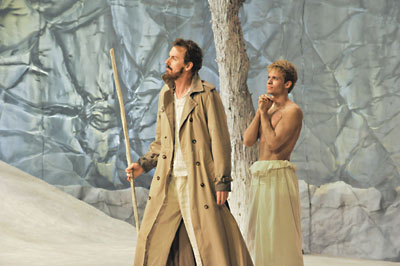 Kevin Moriarty is a director who embraces the full spectacle of Shakespeare, and while you can disagree with his decisions sometimes, you have to respect his commitment. He likes elements we might consider by-products of the Elizabethan Age, its Hey-Nonny-Nonnyisms: Interludes of courtly ballets and minstrel-strummed songs, arresting, fourth-wall-violating asides to the audience, expository speechifying — everything Chekhov and Ibsen and a host of others steered away from.
Kevin Moriarty is a director who embraces the full spectacle of Shakespeare, and while you can disagree with his decisions sometimes, you have to respect his commitment. He likes elements we might consider by-products of the Elizabethan Age, its Hey-Nonny-Nonnyisms: Interludes of courtly ballets and minstrel-strummed songs, arresting, fourth-wall-violating asides to the audience, expository speechifying — everything Chekhov and Ibsen and a host of others steered away from.
But he’s also a director who appreciates contemporary stagecraft: Reconfiguring the structure of plays, emphasizing the astonishing pageantry of an evening at the theater — sometimes taking us out of the play, but often with grandeur. The balance isn’t always an easy one, but it can take your breath away.
There are several such gasp-inducing moments in his staging of The Tempest, starting with the opening scene, set on an airplane instead of a boat. As the wizard Prospero (Chamblee Ferguson, pictured left), like Desmond from Lost, rips the jet from the sky, the stage instantly transforms into a barren wasteland, as stark and beautiful as any set the Dallas Theater Center has ever produced. There are trap doors and bits of magic and flying fairies. It will make you say, “Wow.”
But there are also the many edits. Yes, some of the talkiness is removed, but also some of the scope. And keeping it without an intermission leaves one’s butt castigated by those Wyly seats for nearly two hours.
This Tempest feels more like a series of vignettes than a single story: The comic relief, the sappy romance, the political intrigue, the long-stewing recriminations, bracketed by Ferguson’s Ahab-like Prospero. At first, he’s a vengeful terrorist and hypocritical zookeeper, enslaving his island’s native fauna, the ethereal Ariel (lithe, white-eyed Hunter Ryan Herdicka, pictured right) and its Orc-ish Caliban (Joe Nemmers, delivering us Quasimodo of the mud with poignancy and humor). Then Prospero changes gears, softening and showing mercy, moved by his daughter Miranda’s love for his enemy’s son.
The Tempest is problematic Shakespeare, neither comedy nor history nor classically tragic, but a romance with obscure motivations (how quickly Prospero’s mind is changed by Miranda’s capricious libido, when her suffering for two decades went unnoticed) made more obscure in this version — Prospero seems more like ringmaster than protagonist. Ah, well: The Bard was a better poet than playwright, so let’s give credit to Moriarty for taking this Tempest out of the teapot.
— Arnold Wayne Jones
Wyly Theatre, 2401 Flora St. Through Oct. 9. DallasTheaterCenter.org.
This article appeared in the Dallas Voice print edition September 23, 2011.















